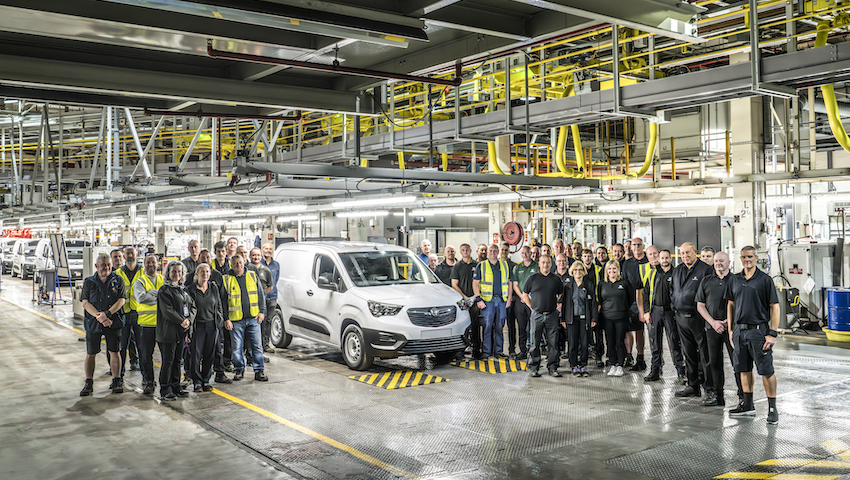
Stellantis begins production of electric vehicles at Ellesmere Port
Production of electric vehicles at Stellantis’ Ellesmere Plant has begun with the first all-electric vans rolling off the line.
Ellesmere Port is the UK’s first EV-only manufacturing plant and the first Stellantis plant globally dedicated to electric vehicles, following a £100 million investment to transform the plant for EV production.
The Ellesmere Port plant will produce the Vauxhall Combo Electric, Opel Combo Electric, Peugeot e-Partner, Citroën ë-Berlingo and, being announced today, due to increased demand for electric vehicles across Europe, the Fiat E-Doblò, compact vans.
From 2024, Ellesmere Port will also produce a range of electric passenger vehicles across the Stellantis brands, including the Vauxhall Combo Life Electric, Peugeot e-Rifter and Citroën ë-Berlingo MPVs.
Kemi Badenoch, Secretary of State for Business and Trade, said: “Today’s announcement in which Ellesmere Port becomes the UK’s first electric vehicle-only manufacturing plant and the first Stellantis plant globally dedicated to electric vehicles, is a very visible demonstration that this Government has got the right plan for the UK’s automotive sector. Alongside recent investments from other major vehicle manufacturers, we are ensuring the UK remains at the forefront of automotive innovation as well as securing jobs in this critical industry and its wider supply chain.”
Diane Miller, Plant Director, Ellesmere Port, said: “The start of electric vehicle production at Ellesmere Port signals a bright future for the plant, ensuring it will continue to manufacture vehicles for many years to come. With Vauxhall’s long history of UK manufacturing, it’s especially fitting that the first electric model to roll off Ellesmere Port’s production line is a Combo Electric. Whilst the welcome addition of the Fiat E-Doblò to the plant is a positive reflection of increasing electric vehicle demand.
Stellantis is committed to working with the Government to ensure the UK automotive industry remains competitive for producing electric vehicles for the long-term.”
As part of its transformation for EV production, the Ellesmere Port plant has undergone several key changes, including the addition of a battery assembly shop, upgraded General Assembly and relocation of the bodyshop. This has contributed to a 60% reduction of the total site area for improved energy efficiency and productivity. At 118,000m2, the entire plant is now a similar size to the previous bodyshop.
A new test track has also been built and a new parts distribution warehouse is in its final stages of construction, ahead of becoming fully operational in early 2024.
The plant upgrade also forms a part of Stellantis’ Dare Forward 2030 commitment to halve its carbon footprint by 2030 (based on 2021 data) and to become carbon net zero, globally, from 2038. Sustainability improvements include the introduction of a new, more energy efficient ‘4-wet’ paint application process, while a localised CHP (combined heat and power) plant is also being installed to generate electricity on-site, bringing a further reduction in emissions.
As part of its ambition to become carbon neutral before the end of the decade, the plant is working towards running on solar and wind power as well as connecting to the HyNet North West Hydrogen Pipeline.
Ellesmere Port was built in 1962 and produced its first car, the Vauxhall Viva, in 1964. Since then, it has produced iconic models from the Vauxhall range including the Chevette and successive generations of the Vauxhall and Opel Astra. Since 1985, more than 4.1 million units have rolled off the production lines at Ellesmere Port.
Among the first electric vehicles to be produced at Ellesmere Port, the Vauxhall Combo Electric, is powered by a 50kWh lithium-ion battery paired with a 100kW (136PS) electric motor. It is capable of up to 175 miles of range (WLTP), while a 0-80% charge can be completed in just 30 mins from a 100kW rapid charger.
Vauxhall, Peugeot, Citroën and Fiat are currently the only mainstream automotive brands to produce vans in Britain. Alongside the Ellesmere Port plant, they all continue to make vans at the Stellantis factory in Luton, which has been operating since 1905.